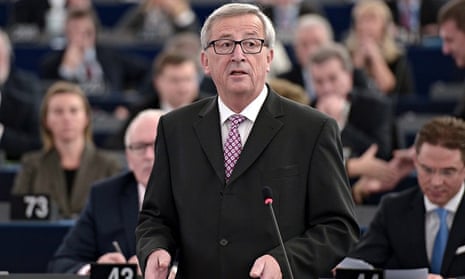Concern is growing that an ambitious package to galvanise the circular economy in Europe could be blocked after leading businesses say the moves would inhibit competitiveness.
The European Commission is set to discuss the proposed measures on Tuesday in a move that will inevitably be interpreted as a signpost for the green agenda under new president Jean-Claude Juncker.
Juncker, who assumed the presidency last month, has pledged to be “more ambitious on big things, and smaller and more modest on small things” (pdf) – a commitment that environmentalists fear could play into calls from big business to weaken green targets.
The circular economy package, which was tabled in July, includes an 80% recycling target for packaging by 2030 and a ban on sending recyclable materials to landfill by 2025.
Waste reduction and resource efficiency are both key tenets of the circular economy, which advocates an end to “take, make, use, dispose” models of production in favour of “closed loop” approaches that see raw materials continually recycled and reused.
Political wrangling
BusinessEurope, an influential trade lobby, says it wants the proposed package to be “withdrawn and re-tabled as an economic piece of legislation” rather than an environmental policy. In an official communication, it argues that the circular economy measures should be “ditched on the grounds that they would inhibit the competitiveness of European businesses”.
Green groups fear that such arguments could be winning the ear of the 28 Commissioners. A meeting of the Commission earlier this week reportedly concluded that “no foreseeable agreement” could be found between MEPs and EU member states over the measures.
In a last ditch attempt to salvage the package, 11 member states recently wrote to the Commissioners with a plea to “carefully analyse” the upsides of a more circular economy.
“The European Parliament has also put forward the advantages of the package... both for the environment and the economy. Higher and continued improvements of resource efficiency performance are within reach and can bring major economic benefits”, states the letter, which is signed by environmental ministers from Germany, France, Italy and Sweden, among others.
The circular economy package also comprises non-binding “aspirational” goals, including the phasing out of landfilling of all recoverable waste by 2030 and a 30% reduction of waste by 2025.
Green groups maintain that the anti-competitiveness argument put forward by some in big business is wrong-headed. They point to a recent report (pdf) prepared by consultancy firm McKinsey and the non-profit Ellen Macarthur Foundation, which puts the economic gain from material savings alone at over $1tn per year. Half a million jobs are already created by the recycling industry in the EU, the report also points out.
“I’m definitely in favour of the idea that the EU should be big on big things and small on small things, but there is no doubt in my mind that the circular economy is a big thing,” says Ida Auken, a Danish politician and Denmark’s former environment minister.
Auken joins other circular economy advocates in arguing that the Commission’s review should, if anything, see the proposal expanded rather than curtailed. “I hope that reviewing means making this package bigger and making it be about business, competitiveness, new jobs and innovation”, she argues.
Progressive voices
Not all corporations follow the position of BusinessEurope and its anti-regulatory ilk. Last month, members of the EU-wide Alliance for Beverage Cartons and the Environment wrote an open letter to Frans Timmermans, the Commission’s first-vice president, stating the case for tougher recycling standards.
“From our specific point of view, to stop or withdraw the proposal at this point risks exacerbating a trend we see towards fragmentation of packaging waste producer responsibility schemes”, the business-led alliance argues.
Similarly, Dutch carpet manufacturer and “cradle-to-cradle” protagonist Desso stresses the “urgent need” to tackle the problem of waste. “In 2010, the EU generated 2.5 billion tonnes of waste but only 36% of this was recycled,” says Alexander Collot d’Escury, Desso’s chief executive.
Collot d’Escury insists that circular models of production can drive innovation in business systems and design, generate new wealth through material cost savings, and create new jobs. “It is a great opportunity not to be missed”, he states.
The Ellen MacArthur Foundation, a leading promoter of circular economy, remains confident that the case for resource efficiency will eventually win out. EU member states rely on energy imports for more than half (53%) of its gross energy consumption, notes the foundation’s executive officer, Jocelyn Blériot. The percentage of raw material imports is even higher, he adds.
“Europe is geologically resource poor [so] there is a lot of scope to try to move towards an economic development [model] that would be decoupled from the consumption of resources and move more towards the reuse of the resources we already have”, he says.
Regardless of what the Commission decides next week, Blériot concedes that much needs to be done to educate traditional “linear” businesses about the bottom-line benefits of a more circular approach.
“It’s a very important agenda,” he argues. “If people approach it in the right way and we show that this is a development agenda – it’s competitiveness, it’s jobs – then why wouldn’t it be adopted.”
Read more like this:
- How much do you know about the circular economy? - quiz
- Waste-free, Willy Wonka packaging is coming but are consumers ready for it?
- Brought to you by Philips: Circular economy: this is the future for business - interactive
The circular economy hub is funded by Philips. All content is editorially independent except for pieces labelled brought to you by. Find out more here.
Join the community of sustainability professionals and experts. Become a GSB member to get more stories like this direct to your inbox

Comments (…)
Sign in or create your Guardian account to join the discussion